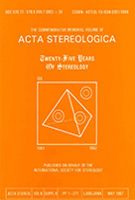Classification procedures for diagnosis based on multiple morphometric parameters
Departments of Biomathematical Sciences and Pathology, Box 1023, Mount Sinai School of Medicine of the City University of New York, One Gustave L. Levy Place, New York, NY 10029, USA
Departments of Biomathematical Sciences and Pathology, Box 1023, Mount Sinai School of Medicine of the City University of New York, One Gustave L. Levy Place, New York, NY 10029, USA
Abstract
A diagnosis in pathology is a classification based upon multiple parameters. Therefore, an important challenge in morphometry is to determine what the most effective classification procedure is for a given setting; in practice, this applies to a narrow differential diagnosis between predetermined choices of similar morphology. To resolve this problem, a number of approaches have been recommended, both statistical and non-statistical. Among the statistical classificatory procedures are discriminant analysis, logistic regression, k-nearest neighbor analysis, and recursive partitioning. Among the non-statistical procedures, the community has expressed a preference for artificial neural networks. Experience in our laboratory using neural networks in the diagnosis of histology and cytology specimens suggests the tentative conclusion that in comparison with other classificatory algorithms, neural networks are the method of choice.
